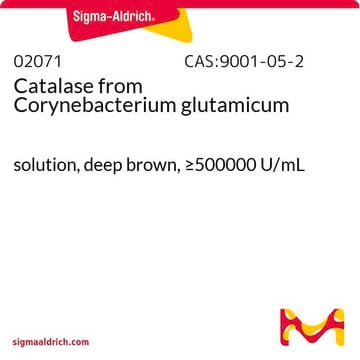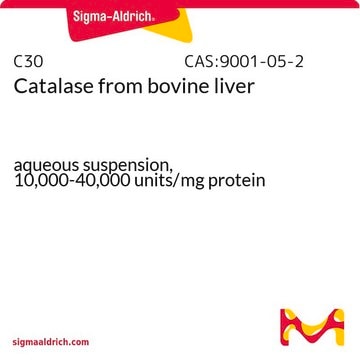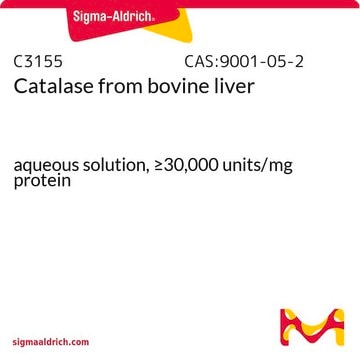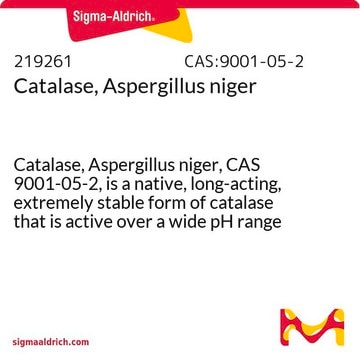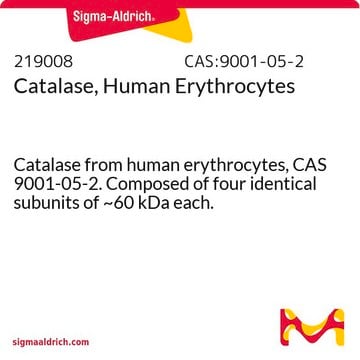60634
Catalase from Micrococcus lysodeikticus
solution, dark brown
Iniciar sesiónpara Ver la Fijación de precios por contrato y de la organización
About This Item
Productos recomendados
origen biológico
bacterial (Micrococcus lysodeikticus)
Nivel de calidad
formulario
solution
actividad específica
65,000-150,000 U/mL
mol peso
Mr ~230000
técnicas
microbe id | metabolite detection: suitable
color
dark brown
solubilidad
0.05 M phosphate buffer pH 7.0: soluble, clear, brown (1:10)
Nº de acceso Protein ID
Nº de acceso UniProt
Condiciones de envío
wet ice
temp. de almacenamiento
2-8°C
InChI
1S/C9H10O3/c1-2-12-9(11)7-3-5-8(10)6-4-7/h3-6,10H,2H2,1H3
Clave InChI
NUVBSKCKDOMJSU-UHFFFAOYSA-N
Descripción general
Research area: Cell Signaling
Catalase (CAT) is an antioxidant enzyme, encoded by the CAT gene family. The enzyme is ubiquitously expressed in most of the aerobic organisms.
Catalase (CAT) is an antioxidant enzyme, encoded by the CAT gene family. The enzyme is ubiquitously expressed in most of the aerobic organisms.
Aplicación
Catalase from Micrococcus lysodeikticus has been used to eliminate excess of hydrogen peroxide production during sugar analog synthesis by in vitro biocatalytic cascade. It has also been used as a standard to evaluate oxidative stress by indirectly measuring catalytic activity.
Acciones bioquímicas o fisiológicas
Catalase rapidly converts hydrogen peroxide to oxygen and water. It exhibits antioxidant activity and elicits a defense mechanism against reactive oxygen species (ROS). Catalase plays a role in neutralizing noxious hydrogen peroxide in nature as well as in various industries such as textile, pharma, and dairy. Micrococcus lysodeikticus catalase is a heme-containing protein.Catalase, along with various key cellular systems involved in hydrogen peroxide (H2O2) processing, plays a key role in regulating cellular redox balance and aids in cellular and intercellular signaling.
Definición de unidad
1 U corresponds to the amount of enzyme which decomposes 1 μmol H2O2 per minute at pH 7.0 and 25 °C
Palabra de señalización
Danger
Frases de peligro
Consejos de prudencia
Clasificaciones de peligro
Resp. Sens. 1
Código de clase de almacenamiento
10 - Combustible liquids
Clase de riesgo para el agua (WGK)
WGK 1
Punto de inflamabilidad (°F)
Not applicable
Punto de inflamabilidad (°C)
Not applicable
Equipo de protección personal
Eyeshields, Gloves
Choose from one of the most recent versions:
¿Ya tiene este producto?
Encuentre la documentación para los productos que ha comprado recientemente en la Biblioteca de documentos.
Los clientes también vieron
Margarita Florencio et al.
Comparative biochemistry and physiology. Part A, Molecular & integrative physiology, 242, 110654-110654 (2020-01-12)
Organisms are exposed to multiple environmental factors simultaneously to which they often respond behaviorally, morphologically and/or physiologically. Amphibian larvae are quite plastic and efficiently adjust their phenotype and physiology to the reigning local conditions. Here we tested whether the combination
Physiological mechanisms of adaptive developmental plasticity in Rana temporaria island populations.
Pablo Burraco et al.
BMC evolutionary biology, 17(1), 164-164 (2017-07-08)
Adaptive plasticity is essential for many species to cope with environmental heterogeneity. In particular, developmental plasticity allows organisms with complex life cycles to adaptively adjust the timing of ontogenetic switch points. Size at and time to metamorphosis are reliable fitness
Ivan Gomez-Mestre et al.
PloS one, 8(12), e84266-e84266 (2013-12-21)
Many amphibian species exploit temporary or even ephemeral aquatic habitats for reproduction by maximising larval growth under benign conditions but accelerating development to rapidly undergo metamorphosis when at risk of desiccation from pond drying. Here we determine mechanisms enabling developmental
An improved procedure using ferricyanide for detecting catalase isozymes.
W Woodbury et al.
Analytical biochemistry, 44(1), 301-305 (1971-11-01)
Hessam Sepasi Tehrani et al.
Progress in biophysics and molecular biology, 140, 5-12 (2018-03-14)
Catalase is one of the firsts in every realm of biological sciences. At the same time it also has a number of unusual features. It has one of the highest turnover numbers of all enzymes. It is essential for neutralizing
Nuestro equipo de científicos tiene experiencia en todas las áreas de investigación: Ciencias de la vida, Ciencia de los materiales, Síntesis química, Cromatografía, Analítica y muchas otras.
Póngase en contacto con el Servicio técnico
